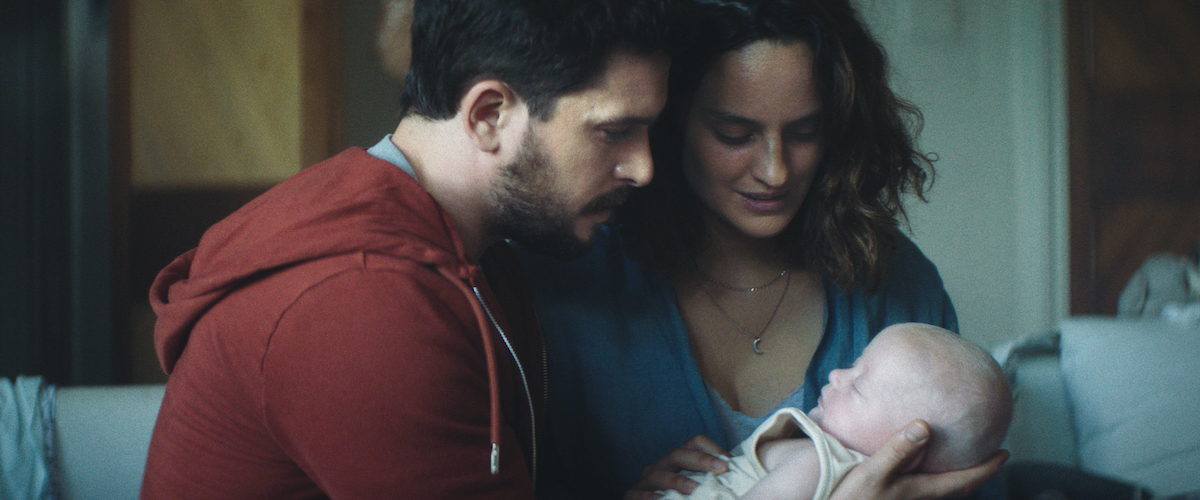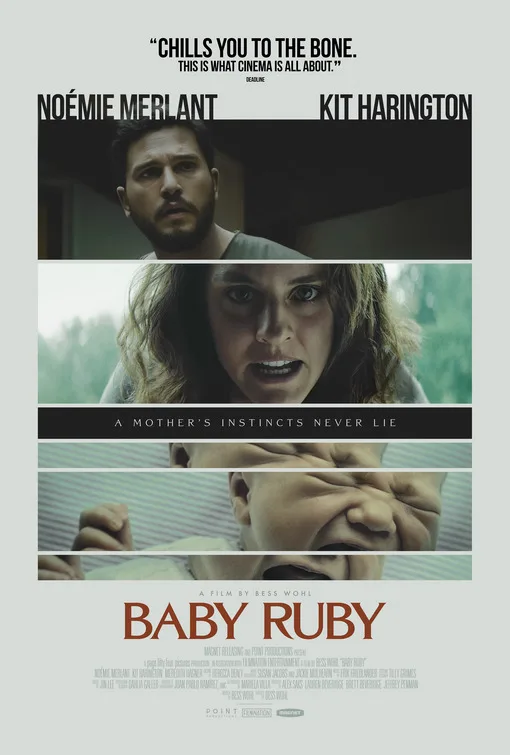“I haven’t seen your baby online yet. Maybe I missed it?”
A mere 10, or 15 years ago, these words would have made little to no sense. The assumptions implied are stark: Your baby should be online. If your baby isn’t online, something’s wrong. Or maybe you posted a pic, and I just missed it? What’s wrong? It’s really weird you haven’t posted a picture of your baby online.
This moment comes early in “Baby Ruby,” playwright Bess Wohl‘s directorial debut. Jo (Noémie Merlant), a French lifestyle blogger living “upstate” with her husband Spencer (Kit Harington), has just had a baby. Since she built a brand “curating” her stylish French-woman-in-America life, the question posed to her by a confused fan is not unwarranted. A lifestyle blogger puts everything else online. She “monetizes” her personal life. She writes about the baby shower, peppering the post with affiliate links. The nine months of pregnancy provided Jo with so much “content”! Then radio silence once the baby is born. Her fans are at first concerned and then irritated.
“Baby Ruby” is about a woman’s experience of not just postpartum depression but postpartum psychosis, and her conviction that her newborn baby is somehow angry with her. Ruby is perceived by Jo as a raging malevolent creature. Ruby cries all the time, and Jo takes the crying personally. She feels like the baby is “punishing” her for something, there’s a flaw in Jo’s character only Ruby perceives. The pediatrician tells Jo, “Babies cry. It’s what they do.” Everybody tells her this. But Jo can’t shake the feeling that something else is going on. Ruby seems hostile. Paranoia ratchets up. Jo wonders if her husband and her mother-in-law (Jayne Atkinson) are in cahoots, if the neighbors are on the level, or if there isn’t something sinister going on.
Wohl keeps the film in close first-person, so Jo’s increasingly terrified mindset is made manifest visibly, with lots of shock cuts and hallucinatory elements, where you’re not sure what is real and what isn’t. The possibility that the whole film is Jo’s hallucination grows with every passing moment. Does she really go out for “Mom drinks” with the breezily gorgeous group of local women who go running every morning pushing baby carriages in front of them? Spencer seems like a good guy, and although his mom might be a little overbearing, they are also rightfully concerned. Or it all might be a front for some “Rosemary’s Baby”-like conspiracy. Jo just can’t be sure. And neither can we.
“Baby Ruby” operates at a high-pitched melodrama-horror level, and the constant frenzy becomes exhausting. The film’s nerves become so frayed there’s almost no feeling left in them; the terror is monotonous and repetitive. In “Rosemary’s Baby,” the terror comes because we can see that Rosemary’s perceptions are accurate, despite all the gaslighting: something sinister IS going on, the neighbors ARE up to no good, her husband IS in cahoots with evil, and something IS wrong with her baby. “Baby Ruby” clearly wants to say something about the struggles many new mothers face, but the horror tropes—the pot boiling on the stove a particularly obvious example—drain away the power from the underlying message. There are only so many “did I just dream it or did it really happen” moments a film can take. There are only two authentically unnerving effects in “Baby Ruby”: one involves Jo’s shadow on the wall, and one involves her reflection in the window. These moments are intriguing and psychological, carrying enormous symbolic weight, but they stand alone.
I keep returning to the fan’s question about why Jo’s baby isn’t online yet. Bess Wohl didn’t give Jo a regular job like a teacher or accountant. Wohl made her an influencer for a reason. Jo set herself up as an authority on many things, including motherhood, an experience she hadn’t even had yet. When Spencer reads out loud from a parenting advice book, Jo is contemptuous: she won’t take advice so “cliched.” She is not a cliche, thankyouverymuch. She’s special. She doesn’t need a book published in the ’80s to tell her what to do. That advice will be passé and probably “problematic” as well. Jo will become the Avatar of Momhood for this new supposedly freer generation.
It’s in this charged arena of cultural observation—entitled girl boss culture, the “pick me girl” turned new mom, the private citizen acting like a celebrity/expert—that “Baby Ruby” has some real bite, not as much bite as “Ingrid Goes West” but close. Unfortunately, these elements are presented more as background noise rather than the main event. Instead, we get scene after scene of Jo seeing horrible things and then “waking up” to realize it was all a dream, although maybe it wasn’t.
Birth is a physically traumatic event. The body and mind need time to recover. Hormones surge through the mother’s body as the pressures—internal and external—pile up. You are expected to be in a state of bliss. You are expected to be automatically “good” at mothering. You are expected to lose the baby weight. Being Extremely Online, as Jo is, intensifies these pressures, something lifestyle bloggers rarely acknowledge. Jo expects her daughter to respond with gratitude to the carefully curated world set up for her. Instead, Ruby wails. Jo’s existential crisis is similar to the one Sylvia Plath so hauntingly evoked in her short poem Child. Plath wanted her child’s eye to see only beautiful things, and instead, the child looks up from its crib to see …
“this troublous
Wringing of hands, this dark
Ceiling without a star.”
There’s a lot of power in those words and a lot of validation for new mothers who suffer from postpartum depression. “Baby Ruby” backs off from the commentary it encourages.
Now playing in theaters and available on demand.




















